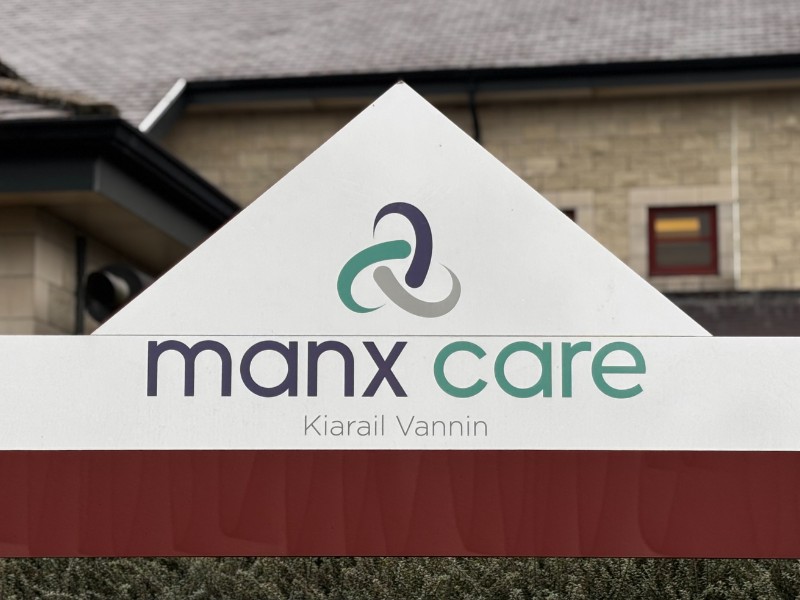
Newly published report presents four options - including scrapping it
An independent report has found that the current health and social care model in the Isle of Man 'is not operating as well as originally intended' following the establishment of Manx Care.
It's found that 'the size and scale of the Island, along with its governance and funding structures, have limited the ability of Manx Care to fully function as an independent arm’s-length body' and identifies 'several fundamental issues that are affecting the core foundations of the current model'.
As a result, four 'strategic options' have been produced to try and rectify the issues. These are:
- OPTION 1: Do nothing
- OPTION 2: Fully implement the Sir Jonathan Michael independent review recommendations
- OPTION 3: Strengthen the partnership between Manx Care and DHSC
- OPTION 4: Reintegrate Manx Care with the DHSC
Options two and three have been deemed the most 'viable', and as such have been more explicitly explored in the report.
Auditors were asked to review the arm's length arrangements between the Department of Health and Social Care (DHSC) and Manx Care; with specific attention given to efficiency, governance, accountability, and efficacy and outcomes.
The resultant report, from the Mersey Internal Audit Agency (MIAA), will be laid before Tynwald at next month's sitting for members to debate, with plans for the DHSC to report to the court in February 2026 with a 'full response and implementation plan'.
ISSUES
As is well-documented, Manx Care was established in April 2021 following the Sir Jonathan Michael report, which was published in 2019.
Within the report, he made 26 recommendations, all of which were unanimously approved by Tynwald.
You can find the report HERE.
Recommendation two explicitly called for the separation of policy and delivery of services.
"The setting of priorities and the development of policy in both health and social care should be separate from the delivery of services. A comprehensive governance and accountability framework should be established aligned to agreed standards and underpinned, where necessary, by legislation. A single public sector organisation, perhaps to be known as “Manx Care”, should be responsible for the delivery and/or commissioning from other providers of all required health and care services." - Recommendation 2, the Sir Jonathan Michael Report
Manx Care therefore was established to run separately from the DHSC, with the department 'retaining responsibility for strategic direction setting, policy development, oversight and assurance', and Manx Care 'responsible for the delivery of a comprehensive range of services to the public through a clearly defined Mandate'.
However, what is clear in the MIAA report, is that this set-up is not working as intended.
Key findings include:
- DHSC structures - 'There have been significant levels of turnover within the DHSC across leadership positions, ministers and wider staff groups, all ultimately impacting upon its stability, corporate memory, consistency of approach, engagement and effective discharge of its functions'
- 'Differential employment terms and conditions of staff working at Manx Care, including the Chief Executive - 'This raises potential conflict of interest and challenges in running the organisation with the variation in terms and conditions – this includes the Public Services Commission (PSC), the DHSC and Manx Care.'
- Funding - 'There is a lack of clarity regarding both the basis of the current formula for the funding allocation to Manx Care and the funding basis for the development of the Mandate and how it aligns to the needs of the Island’s population and strategic plans. There is no activity-based costing in place, limited costed service specifications and a lack of alignment between the costs of the Mandate delivery and the funding allocation. This ultimately means that the costs of service delivery are not known.'
- 'Wider government structures are a contributory factor in the challenges being experienced by the DHSC and Manx Care. There is no individual within government responsible for the totality of the shared service provision.'
- Communication - 'It is evident that the culture, relationships, and engagement between the Treasury, the DHSC, and Manx Care have not been as effective or robust as required. There is a clear need to build trust and confidence across these organisations. There is a perception that the Treasury lacks confidence in the financial governance arrangements currently in place within both the DHSC and Manx Care.'
- Governance - 'Arrangements currently in place are not effective and supports the position that on the separation of the DHSC, the focus was very much on Manx Care and little consideration was given to the governance requirements of the DHSC to support it in its delivery / achievement of its functions. It was evident that there is an overfocus on process rather than outcomes.'
OPTION TWO
The MIAA has presented various options to move forward but only explicitly explores two of four.
The first 'viable' option presented by the MIAA is fully implementing the Sir Jonathan Michael independent review recommendations.
The report states: "This option builds on the current structure under the Manx Care Act 2021, advancing the strategic separation between DHSC and Manx Care. It proposes targeted legislative refinements—including updates to the Manx Care Act, Statutory Boards Act, and mandate frameworks—to clarify governance, strengthen accountability, and support long-term financial and clinical sustainability.
"The DHSC would focus on strategy, commissioning, and regulation, while Manx Care retains operational autonomy. Enhanced integration, digital transformation, and public health centralisation aim to improve outcomes.
"However, risks include financial misalignment, implementation complexity, and cultural challenges between organisations."
Manx Radio asked the DHSC's Interim Chief Officer, Professor Tim O'Neill why Sir Jonathan's recommendations haven't been fully implemented already:
The latest Health and Care Transformation Programme Annual Report, available HERE, highlights which recommendations have been implemented and which are 'ongoing'.
OPTION THREE
The second 'viable' option is strengthening the partnership between Manx Care and the DHSC.
The report states: "This option proposes closer collaboration between DHSC and Manx Care through legislative updates and shared governance mechanisms. Amendments to the Manx Care Act and related legislation would enable joint strategic planning, integrated commissioning, and shared accountability. The approach aims to reduce duplication, improve service integration—including with the third sector—and foster a unified leadership culture. Benefits include enhanced financial oversight, faster decision-making, and improved patient experience. However, risks include potential loss of Manx Care’s operational independence, governance complexity, and cultural misalignment, which may dilute performance and blur strategic and operational roles
The MIAA highlights this option as the 'most viable', according to stakeholders.
But would the idea of further integration between the two parties simply undermine the creation of Manx Care in the first place?
Manx Radio asked Mr O'Neill, who told us: 'Not necessarily':
SCRAP MANX CARE?
Alongside the options deemed 'viable' by the MIAA, there are two other options - do nothing, or scrap Manx Care altogether.
Manx Radio asked Mr O'Neill at what point would government concede to that idea:
STAKEHOLDERS
As part of the review process, 'semi-structured interviews' were held with key stakeholders.
These included, but were not limited to: MHKs, MLCs, government executives and senior managers, the DHSC Executive and Senior Leadership Team, the Manx Care Board and senior managers, the Isle of Man Medical Society, UK providers such as Alder Hey and the Liverpool Heart and Chest Hospital, and third-sector organisations such as the Children's Centre, Crossroads Isle of Man and the Isle of Man Anti-Cancer Association.
Of the Island's politicians, six MLCs and 21 MHKs gave their views.
Manx Radio has sought clarification on this process - including which members did not take part.
In response, the DHSC said:
"All stakeholders were invited to participate initially via an email invitation from the Interim Chief Officer, followed up by a subsequent email from MIAA to confirm the logistical details of the interview.
"Members were given two options; a choice of two group sessions in July 2025 where MIAA rep attended on-Island and/or attend a 1:1 interview with a MIAA representative. The opportunity was available to do both."
The report does state that 'all identified stakeholders were invited to attend meetings, however, there were a small number, who for various reasons chose not to or were unable to attend'.
The MIAA report states that from speaking to stakeholders, it was clear 'that there is little appetite to return to the previous model' - in essence, scrapping Manx Care in favour of the previous integrated model.
It was 'generally viewed that Manx Care as a delivery model is the right model, but as [it's based on] a small island, Manx Care’s ability to operate as truly arm’s-length is challenging and may need to be reconsidered across a number of areas'.
The current approach to funding was also highlighted, with a view that 'without change, the current model will lead to continued overspends and will perpetuate the cycle of mistrust, poor engagement and a lack of confidence from the Treasury and wider stakeholders'.
OPPORTUNITY TO REFLECT
"It's four and a half years since we started - it's the right time to review and have a look at it. Any government structure with this kind of complexity, I think it's right to look at it externally and have a look at what's working and what could be improved, and I think the report makes some clear recommendations." - Tim O'Neill, Interim Chief Executive of the DHSC
The DHSC has stressed that the MIAA report has come at 'the right time to review' the current set-up.
Interim Chief Officer Tim O'Neill told Manx Radio there are 'hard choices to make' on the horizon:
Health and Social Care Minister Claire Christian added: "This review provides an important opportunity to reflect on the current model, address particular issues and adapt appropriately.
"The findings will be debated in the December sitting of Tynwald, where Members will have the opportunity to shape the next steps for our health and social care system.
"Our focus must remain on delivering sustainable, high-quality services for the people of the Isle of Man."
DEBATE
Whilst the MIAA has presented 'a range of options developed to support the discussion, ultimately the final decision rests with the Isle of Man Government'.
The MIAA report will be presented to Tynwald in December, with a response report from the DHSC expected to be presented in February 2026.
How this would impact discussions around the Budget is, as yet, unclear.
When asked, Mr O'Neill told Manx Radio his department will be 'busy' over the next few months, but his officers will be working really closely with Manx Care.
He added: "Bringing the budget, the strategy and a longer-term plan together in one conversation seems to make sense to me."
You can hear that interview in full in our latest Newscast, available below.
Manx Radio contacted Manx Care for comment on the contents of the MIAA report. It says:
"Manx Care welcomes the opportunity to review governance arrangements and reflect on how effectively the current delivery model is working as we continue striving to provide sustainable, high-quality services for the people of the Isle of Man.
"The report confirms that “Manx Care as a delivery model is the right model” and notes that stakeholder interviews have highlighted notable improvements to health and social care services since Manx Care’s establishment.
"Manx Care welcomes this review and supports greater partnership working with DHSC and wider government which will enable our health and care system to operate with greater quality and efficiency, achieving improved outcomes for the population we serve."


 Public sector workers could see increase in level of pensions
Public sector workers could see increase in level of pensions
 Bishop's vote Bill to return to Keys after LegCo passes amendment
Bishop's vote Bill to return to Keys after LegCo passes amendment
 Winners crowned in 'Big Blue Bag' environmental competition
Winners crowned in 'Big Blue Bag' environmental competition
 Nearly 1,000 people still registered to use MiCards
Nearly 1,000 people still registered to use MiCards